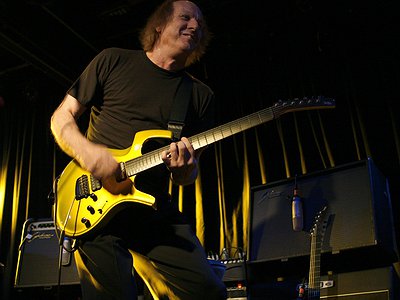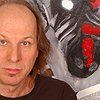The relationship between music and other forms of art – painting, video art and cinema most importantly - has become increasingly important. How do you see this relationship yourself and in how far, do you feel, does music relate to other senses than hearing alone?
Two questions again. It’s a trend! The visual art forms have a distinct advantage over the aural arts. Ask yourself this: would you rather see something or hear something? I believe most people would say seeing is more exciting than hearing. We are a visually oriented society. Each of us walks around today with a powerful IOS device in our pockets continually showing us millions of images. We need imagery.
Ever since the advent of television, music has slowly been taking second place. The sixties were the time when people sat in a comfortable chair, put on their headphones, closed their eyes, and just listened. I feel like music was seen as more important then than it is now. Musicians now have to compliment their music with visuals as best they can.
To me cinema is the best art form of our times because it involves all the other art forms. If I were starting out today I would work in cinema.
Second question: all the senses work in concert don't they?
There seem to be two fundamental tendencies in music today: On the one hand, a move towards complete virtualisation, where tracks and albums are merely released as digital files. And, on the other, an even closer union between music, artwork, packaging and physical presentation. Where do you stand between these poles?
Stuck in the middle. On one hand as an artist, I'm adamant about having a close union between music, artwork, packaging and physical presentation. From my first solo record onward I've always been involved in the physical design of my packages.
I love artwork and feel it greatly compliments the artist's intentions. So much so that over the last decade I've begun including my paintings as part of the artwork. A record without artwork for me is like a book with no pictures, not as satisfying. So I'm a proponent of some kind of physical evidence of my work.
On the other hand I believe the Internet has been a great boon to the music industry. The Internet is a priceless source of knowledge and entertainment. I love the Internet! I have no problem with virtualisation except for one thing: with the advent of the internet it is now considered okay that artists should NOT be paid for their work. When did that become acceptable? I do not accept that because it is unsustainable and unfair.
The role of an artist is always subject to change. What's your view on the (e.g. political/social/creative) tasks of artists today and how do you try to meet these goals in your work?
The role of an artist is different for each individual as it should be. Personally I have no faith in politics or interest. Social causes: I dislike being preached at, especially by pop artists.
For me music is about creativity and self-expression. All my life I've seemed to be different. A kind word to use would be creative. So naturally for my goal I've chosen to be as creative as I can be, to push the boundaries, to be unique and follow my own path regardless. I long ago gave up on doing something to be popular and it suits me well. I feel privileged to do what I do and to have anyone enjoy it.
Music-sharing sites and -blogs as well as a flood of releases in general are presenting both listeners and artists with challenging questions. What's your view on the value of music today? In what way does the abundance of music change our perception of it?
At this moment there is more music available on Spotify than a person could listen to in his or her lifetime if you listened 24/7. To me that says there is too much music. When there is too much of something what happens? Its value plummets.
It changes our perception in this way: there are too many choices and not enough time so eventually we care less. Fortunately this is not necessarily true for younger listeners. So there is hope...I hope.
How, would you say, could non-mainstream forms of music reach wider audiences?
I wish I knew. I wish I could be instrumental somehow in making that happen. Creative music is suffering greatly now. What is popular and rewarded now is the kind of BS you see at a super bowl halftime show. It makes me feel like I am in no way part of the music business. I live completely outside of it. It could be that non-mainstream music is not supposed to reach a wider audience because they wouldn't like it anyway.
Usually, it is considered that it is the job of the artist to win over an audience. But listening is also an active, rather than just a passive process. How do you see the role of the listener in the musical communication process?
Whether the audience knows it or not, they play a vital role in the success or failure of any given performance. I'll let you in on a little secret: the more excited the audience gets, the better I play.
Reaching audiences usually involves reaching out to the press and possibly working with a PR company. What's your perspective on the promo system? In which way do music journalism and PR companies change the way music is perceived by the public?
It seems in today's climate, for all but the biggest stars, self-promotion is the ticket. For most of us, a PR company is not an option. But this works well with the Internet age. Blogs and tweets about every move you make are standard issue. It’s labour intensive and it takes more time but they say it works. I've been fortunate in the continued interest of music journalists and sites such as this one and it remains very important to me. For decades it has been proven that you can buy your way to the top with enough money behind you as many 'artists' have done, but it must be a shallow success.
I say do the music that genuinely moves you and be happy with what you have to be happy with!
Please recommend two artists to our readers that you feel deserve their attention.
I recommend you think of someone you've heard about but never actually listened to. Buy some of their music and have an open mind. Could be your good deed of the day. Now I'm off to perform in Japan. Sayonara.
To read and hear more about Adrian Belew visit his website www.adrianbelew.net



